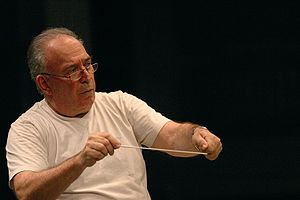- Noam Sheriff
-
Noam Sheriff (Hebrew: נׂעם שריף * January 7, 1935 in Tel Aviv) is an Israeli composer, conductor and arranger. Sheriff is one of Israel’s most versatile and world renowned musicians. Currently, he is the music director of the Haifa Symphony Orchestra.
Contents
Early life
Noam Sheriff studied composition in Tel Aviv with Paul Ben-Chaim and in Berlin with Boris Blacher, conducting in Salzburg with Igor Markevitch, and philosophy at the Hebrew University, Jerusalem.
Work as composer
Since the 1957 premiere of his work Festival Prelude by the Israel Philharmonic Orchestra under Leonard Bernstein at the opening of the Mann Auditorium in Tel Aviv, his works have been regularly performed in Israel and all over the world.
In Noam Sheriff’s music one finds an original solution to the fusion of East and West, of musical elements from ancient Mediterranean cultures and from the West. Among his most significant works are the three scale vocal compositions that form a trilogy. Mechaye Hamethim (Revival of the Dead) which was premiered in Amsterdam by the IPO in 1987, based on the Jewish East-European traditional music as well as on the ancient oriental Jewish themes of the Samaritans. Sephardic Passion, which was premiered in Toledo, Spain, by the IPO, Zubin Mehta and Placido Domingo in 1992, is based on the music of the Sephardic Jewry. Psalms of Jerusalem was premiered in 1995 in Jerusalem to open the 3000 year celebrations of that city with its four choirs around the hall singing in Hebrew and Latin.
His Mechaye Hamethim was performed by the IPO under Mehta in a unique concert at Yad Vashem Holocaust Museum, Jerusalem, marking Israel’s Jubilee, and will additionally feature in the 2012 Salzburg Festival. Sheriff's newest vocal work, Genesis, was commissioned and premiered by the Israel Philharmonic and Maestro Zubin Mehta at the festive concerts of Israel’s 50th Independence day. And Sheriff recently completed an opera called Hagolem (The Clay Automaton).
Work as conductor
Noam Sheriff regularly conducts both his compositions and other works of the orchestral repertoire all over the world. Between 1989 and 1995 he was the Music Director of the Israel Symphony Orchestra Rishon Le-Zion which, under his leadership, achieved success unprecedented in Israeli musical history. Since January 2002 he has been the Music Director of the Israel Chamber Orchestra, which, in its first season under his leadership (2002–03), won the praise of the critics and audiences. In April 2004 he was nominated Music Director of the New Haifa Symphony Orchestra.
Academic career
Since 1963 Noam Sheriff has been teaching composition and conducting. He has taught at such institutes as the Jerusalem and Tel Aviv Universities as well as the Musikhochschule in Cologne and the Mozarteum in Salzburg. Over the years he has directed many music festivals in Israel as well as various television and radio programs. Since 1990 Noam Sheriff has been professor of composition and conducting at the Tel Aviv University's Rubin Academy of Music and, in the years 1998–2000 its Director.
Awards
- In 1991, Sheriff wonthe Acum Prize, for his life's work.[1]
- In 2003, he was awarded the EMET Prize, for music.[1]
- In 2011, he was awarded the Israel Prize, for music.[2][3]
He has also been nominated as one of the 50 most influential figures in Israeli music.
Selected Works
Noam Sheriff's works are published by IMI and by C.F. Peters Edition, Frankfurt.
- Festival Prelude, 1957
- Heptaprism, Ballet, 1965
- Israel-Suite, 1967
- May Ko Mashma Lan..., Essay for harp and string quartet, 1976
- Essay for string orchestra, 1977
- Prayer for strings, 1983
- La Follia Variations, 1984
- Partita for viola and cello, "LI-GUR" 1984
- Mechaye Hamethim (Revival of the Dead), 1985
- Sephardic Passion, 1992
- Scarlattiana, piano concerto, 1994
- Psalms of Jerusalem, 1995
- Wenn das Pendel der Liebe schwingt...", Six Songs after Paul Celan, 1996
- Akeda, 1997
- Bereshit,1998
- Golem 13, Opera, 2008
See also
References
- ^ a b Resume of Noam Sherriff (in Hebrew), Israel Prize website.
- ^ Judges Rationale for grant of Israel Prize (in Hebrew), Israel Prize website
- ^ Composer Noam Sheriff wins Israel Prize for music Haaretz, March 9, 2011
External links
- Noam Sheriff's website
- Sheriff's home page at C.F. Peters edition
- Resume of Noam Sheriff (in Hebrew), Israel Prize website.
Categories:- 1935 births
- Living people
- 20th-century classical composers
- Israeli classical musicians
- Israeli composers
- Israeli conductors (music)
- Jewish classical musicians
- Israel Prize in music recipients
- Israeli Jews
- Israeli people of Belarusian origin
Wikimedia Foundation. 2010.

